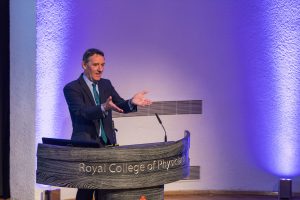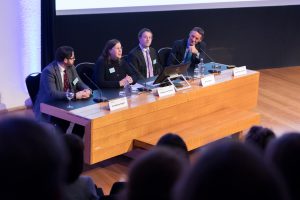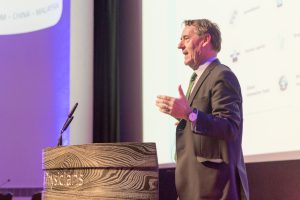January 26, 2017, by Liz Cass
Academics join former Minister to debate a threat bigger than cancer
University of Nottingham experts joined the economist behind a Government Review on Antimicrobial Resistance (AMR) to spark debate on a crisis that kills 700,000 people a year.
Lord Jim O’Neill, along with a panel of academic and industry experts, spoke to a packed audience at the Royal College of Physicians as part of the University’s Chancellor’s Lecture series.
Lord O’Neill led a review into AMR which was published last year.
He warned that our growing resistance to antimicrobials, in particular antibiotics, is a threat greater than cancer and could claim 10 million lives by 2050.
Blaming previous attitudes and overuse of antibiotics he said that lack of action could impact world economic development- specifically a loss of $100 trillion.
A Google for Doctors
As part of his lecture Lord O’Neill spoke about the challenges ahead.
On September 23 2016, All 193 UN member states agreed to combat the proliferation of drug-resistant infections – the fourth time such an agreement has been reached on a health issue.
But he said more needed to be done, including in the following areas:
- Public awareness
- Sanitation and hygiene – even basic improvements, like washing hands, could make a difference
- Surveillance and data – to help countries collect data
- Rapid diagnostics (the need for a tool like Google for Doctors) to remove the guess work and reduce the number of antibiotic prescriptions that are unnecessary
- Reducing the use of drugs in agriculture and farming
- Reducing use of antibiotics in animals
He added that it was far more important to address these issues than to focus on new drugs and alternatives, but pharmaceuticals and researchers in this area were part of the puzzle.
In the panel discussion, which included The University of Nottingham’s Liz Sockett, Professor in the Faculty of Medicine and Health Sciences, Dov Stekel, Associate Professor of Integrative Systems Biology in the Faculty of Science, and Matthew Diggle, Consultant at Nottingham University Hospital, Lord O’Neill said that global cooperation was the only way to solve the issue – estimating a spend of $40 million would be needed. He said the G20 set to take place in Germany should identify the drugs of the future and look towards phage research (already taking place in Nottingham).
The panel also discussed ways of future proofing against more AMR in the future and added that new technology and apps would help increase education and awareness.
No comments yet, fill out a comment to be the first






Leave a Reply